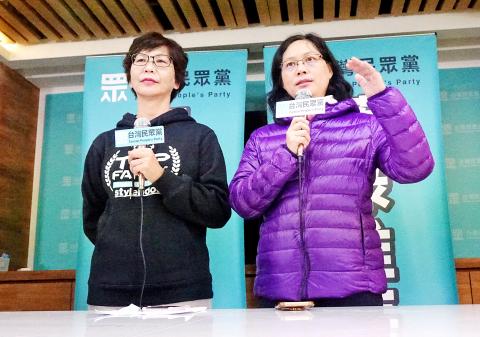Taipei Mayor Ko Wen-je (柯文哲), chairman of the Taiwan People’s Party (TPP), on Saturday night said the “revolution” was just beginning after his party won five at-large seats in Saturday’s legislative elections to become the third-largest party in the Legislative Yuan.
The next critical point would be the 2022 local elections, he said.
The TPP was established by Ko and his aides in August last year, positioning itself as a party that transcends the blue-green divide, while aiming to become a “critical minority party” in the legislature.

Photo: Fang Pin-chao, Taipei Times
Although the party failed to secure regional legislative seats, it received 1,588,806 party votes, or 11.22 percent, to pass the 5 percent threshold for obtaining legislator-at-large seats.
It would also be eligible to receive government subsidies for campaign funding, as it passed the 3 percent vote threshold, and would be eligible to nominate a candidate for the 2024 presidential election.
Ko told his supporters that by standing together and holding on to their ideals, the TPP’s legislative candidates made a breakthrough in the elections while facing “attacks” from the pan-blue and pan-green camps.
Their efforts would change Taiwan’s political culture, he said.
“The Chinese Nationalist Party (KMT) and the Democratic Progressive Party (DPP) have taken turns being the ruling party over the past two decades, but the country has come to a standstill and people’s lives have not changed, so society must go beyond the blue-green divide to move forward,” he said. “The TPP is the new choice for the people, aside from blue or green.”
Creating an “inclusive society” and emphasizing “state governance” would be the TPP’s two main principles, Ko added.
Responding to media queries about the DPP obtaining a legislative majority, Ko said that while the TPP would be unable to play the role of “critical minority party” and influence the voting results for bills or policies, it would try to play the role of “demonstrative effect” or “shadow cabinet.”
When unreasonable bills are proposed, TPP legislators would not throw water balloons or file for a constitutional interpretation, but they would clearly explain why the party thinks the policy is wrong, Ko said.
As long as the bills or policies proposed are good for the people, the TPP would not limit itself to a certain ideology, and would cooperate with other parties, he said.

Taiwan is to commence mass production of the Tien Kung (天弓, “Sky Bow”) III, IV and V missiles by the second quarter of this year if the legislature approves the government’s NT$1.25 trillion (US$39.78 billion) special defense budget, an official said yesterday. Commenting on condition of anonymity, a defense official with knowledge of the matter said that the advanced systems are expected to provide crucial capabilities against ballistic and cruise missiles for the proposed “T-Dome,” an advanced, multi-layered air defense network. The Tien Kung III is an air defense missile with a maximum interception altitude of 35km. The Tien Kung IV and V

The disruption of 941 flights in and out of Taiwan due to China’s large-scale military exercises was no accident, but rather the result of a “quasi-blockade” used to simulate creating the air and sea routes needed for an amphibious landing, a military expert said. The disruptions occurred on Tuesday and lasted about 10 hours as China conducted live-fire drills in the Taiwan Strait. The Civil Aviation Administration (CAA) said the exercises affected 857 international flights and 84 domestic flights, affecting more than 100,000 travelers. Su Tzu-yun (蘇紫雲), a research fellow at the government-sponsored Institute for National Defense and Security Research, said the air

Taiwan lacks effective and cost-efficient armaments to intercept rockets, making the planned “T-Dome” interception system necessary, two experts said on Tuesday. The concerns were raised after China’s military fired two waves of rockets during live-fire drills around Taiwan on Tuesday, part of two-day exercises code-named “Justice Mission 2025.” The first wave involved 17 rockets launched at 9am from Pingtan in China’s Fujian Province, according to Lieutenant General Hsieh Jih-sheng (謝日升) of the Office of the Deputy Chief of the General Staff for Intelligence at the Ministry of National Defense. Those rockets landed 70 nautical miles (129.6km) northeast of Keelung without flying over Taiwan,

A strong continental cold air mass is to bring pollutants to Taiwan from tomorrow, the Ministry of Environment said today, as it issued an “orange” air quality alert for most of the country. All of Taiwan except for Hualien and Taitung counties is to be under an “orange” air quality alert tomorrow, indicating air quality that is unhealthy for sensitive groups. In China, areas from Shandong to Shanghai have been enveloped in haze since Saturday, the ministry said in a news release. Yesterday, hourly concentrations of PM2.5 in these areas ranged from 65 to 160 micrograms per cubic meter (mg/m³), and pollutants were